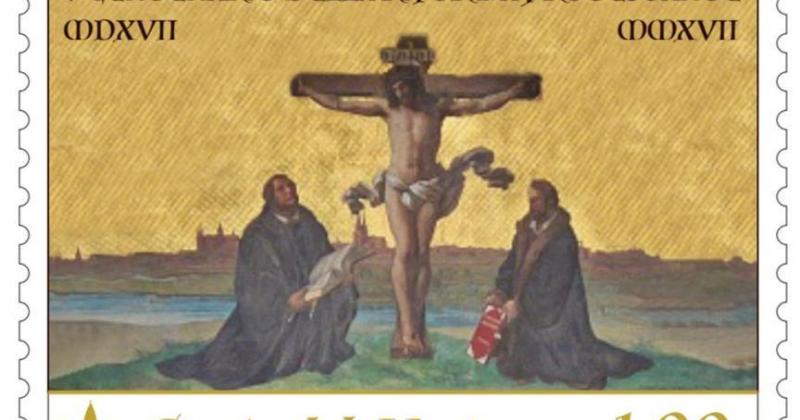Communiqué of the World Lutheran Federation and Pontifical Council for Christian Unity at the end of the 500th anniversary. And the Vatican issues a stamp with Wittenberg.
*****
The World Lutheran Federation and the Pontifical Council for the Promotion of Christian Unity are said to be “grateful for the spiritual and theological gifts” received during the ecumenical commemoration of the Protestant Reformation, on the day when the year of its celebrations ends, exactly 500 years after the day in which, according to the tradition, Martin Luther hung his 95 theses on the door of Wittenberg Cathedral, on October 31,2017. In a joint communiqué, they emphasize the past cannot be changed, its influence upon us today can be transformed to become a stimulus for growing communion, and a sign of hope for the world to overcome division and fragmentation”.
“On 31st of October 2017, the final day of the year of the common ecumenical Commemoration of the Reformation, we are very thankful for the spiritual and theological gifts received through the Reformation”, reads the text issued by the Vatican press room. “A commemoration that we have shared together and with our ecumenical partners globally. Likewise, we begged forgiveness for our failures and for the ways in which Christians have wounded the Body of the Lord and offended each other during the five hundred years since the beginning of the Reformation until today. We, Lutherans and Catholics, are profoundly grateful for the ecumenical journey that we have travelled together during the last fifty years. This pilgrimage, sustained by our common prayer, worship and ecumenical dialogue, has resulted in the removal of prejudices, the increase of mutual understanding and the identification of decisive theological agreements. In the face of so many blessings along the way, we raise our hearts in praise of the Triune God for the mercy we receive.”
The commemorative year, the document underlines, began with the Pope’s trip to Lund, Sweden, for a joint Lutheran-Catholic prayer with Bishop Munib A. Younan, followed by a joint declaration and the relaunching of collaboration in charitable activity.
“Among the blessings of this year of Commemoration, - the communiqué still states,” is the fact that for the first time Lutherans and Catholics have seen the Reformation from an ecumenical perspective. This has allowed new insight into the events of the sixteenth century which led to our separation. We recognize that while the past cannot be changed, its influence upon us today can be transformed to become a stimulus for growing communion, and a sign of hope for the world to overcome division and fragmentation. Again, it has become clear that what we have in common is far more than that which still divides us.”
After having recalled the Joint Declaration on the Doctrine of Justification, signed by Lutherans and Catholics in 1999, the communiqué recalls that in 2006 the Medotists also signed, this year the World Communion of the Reformed Churches and “On this very day it is being welcomed and received by the Anglican Communion at a solemn ceremony in Westminster Abbe”.
We acknowledge with appreciation the many events of common prayer and worship that Lutherans and Catholics have held together with their ecumenical partners in different parts of the world, as well as the theological encounters and the significant publications that have given substance to this year of Commemoration. Looking forward, we commit ourselves to continue our journey together, guided by God’s Spirit, towards the greater unity according to the will of our Lord Jesus Christ.
Today, the philatelic and numismatic office of the Vatican City State printed a commemorative stamp of the Reformation, which portrays Jesus crucified in the foreground against the golden and timeless background of the city of Wittenberg. In an attitude of penance, kneeling respectively to the left and right of the Cross, Martin Luther holding the Bible, the source and goal of his doctrine, while Philip Melantone, theologian and friend of Martin Luther, one of the major protagonists of the reform holds the Confession of Augusta, Confessio Augustuana, the first official exhibition of the principles of Protestantism he drafted.
Finally, the Evangelical Lutheran Church in Italy (Celi) and the Italian Episcopal Conference, with the signature of Pastor Heiner Bludau and Bishop Ambrose Spreafico, have also issued a jointly drafted declaration in which it is stated, among other things, that “strengthening friendship in fraternity, at the foot of the Cross of Christ, will help us to foster a reconciliation of memories capable of supporting Catholics and Lutherans in the announcement. and in witnessing the Word of God in contemporary society, to promote an ever more evangelical reform of the daily life of local communities”.
